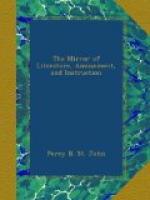The natives of Manicolo are not cannibals; but when an enemy falls into their power he is immediately killed, and his body is deposited in sea-water, and kept there until the bones become perfectly bare. The skeleton is then taken up, the bones of the extremities scraped and cut into various forms, to point arrows and spears. Their arms consist of heavy clubs, spears, and bows and arrows. They poison the latter with a kind of reddish gum, extracted from a species of tree peculiar to the island. When any one is struck by a poisoned arrow in any of the limbs, the part is quickly cut out, and his life is sometimes saved; but if the wound happens to be in the body, where it cannot be easily excised, he resigns himself quietly to death without a murmur, though he frequently lingers for four or five days in excruciating agony.
The Manicolans differ from almost all the other islanders in the South Sea; they are as black as negroes, have short woolly hair, and resemble them in their features. Their religion also is different; in every village in the island there is a house dedicated to the Deity. At the principal chapel, the skulls of all the people who were killed, belonging to the ship that grounded at Whanoo, are still preserved. The natives of Tucopia, unaccustomed to the sight of human bones, avoid, as much as possible, when they visit the island, approaching the sacred house where the skulls are deposited.
* * * * *
THE SELECTOR; AND LITERARY NOTICES OF NEW WORKS.
* * * * *
WAVERLEY NOVELS.
The new edition, (of which Waverley has just appeared,) is, without exception, the handsomest book of the day, in editorship, literary and graphic embellishment or typography. Perhaps little persuasion was necessary for a second reading of so delightful a novel as Waverley, but the author’s piquant notes to the present edition would alike tempt the matter-of-fact man, and the inveterate novel reader to “begin again.” The prefatory anecdotes to Waverley are extremely interesting—and the little autobiographic sketches are so many leaves from the life of the ingenious author. We hope to introduce a few of the notes of the Series; but content ourselves for the present with the following: being the original of the legend of Mrs. Grizel Oldbuck:
Mr. R——d of Bowland, a gentleman of landed property in the vale of Gala, was prosecuted for a very considerable sum, the accumulated arrears of teind (or tithe) for which he was said to be indebted to a noble family, the titulars (lay impropriators of the tithes.) Mr. R——d was strongly impressed with the belief that his father had, by a form of process peculiar to the law of Scotland, purchased these lands from the titular, and therefore that the present prosecution was groundless. But after an industrious search among his father’s papers,




